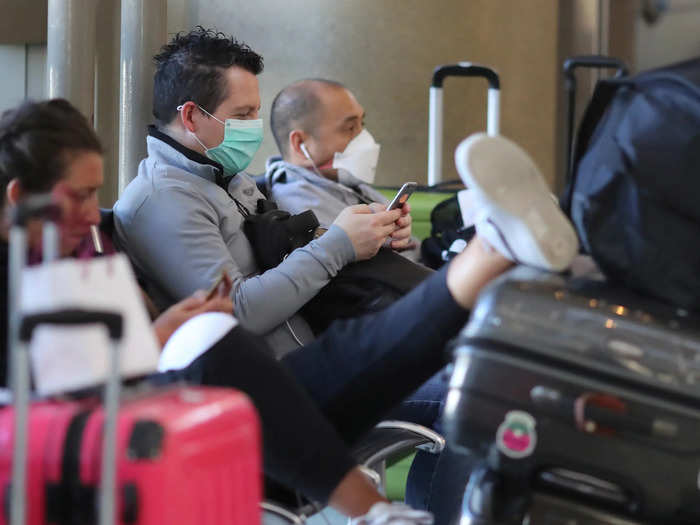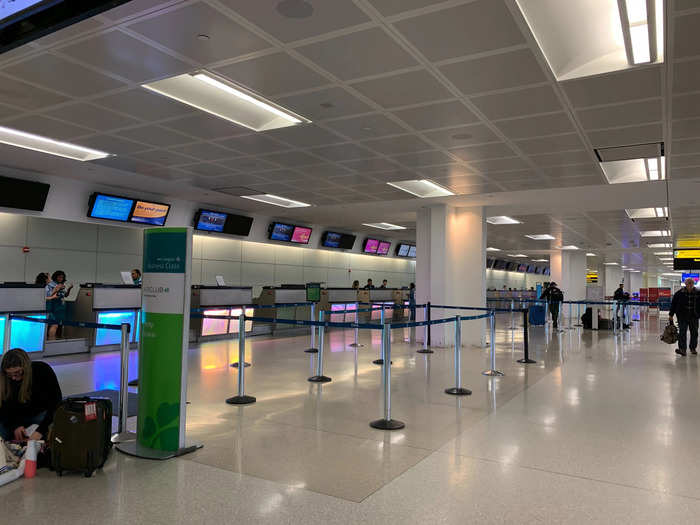- Home
- slideshows
- miscellaneous
- Delta, American, and other airline workers say coronavirus travel bans and plummeting demand has them worried they'll lose their jobs, just as COVID-19 continues to spread
Delta, American, and other airline workers say coronavirus travel bans and plummeting demand has them worried they'll lose their jobs, just as COVID-19 continues to spread
Less concerned about the virus itself, but still taking precautions.

What airlines are doing to safeguard passengers and crew.

Since early in the outbreak, airlines have detailed steps they're taking to keep planes clean and help protect flight crews.
"I've never experienced the airline industry being as engaged and proactive as they have been with this," Sara Nelson, head of the Association of Flight Attendants, told Business Insider in an interview last week. "So I want to really applaud the airlines."
"We changed the way we do service on the plane," a flight attendant for a regional airline said. "We use gloves now, we don't touch seatbelts anymore, and they have more cleaners coming on board."
A Chicago-based flight attendant for American Airlines said that the airline was offering more resources for flight attendants.
"American is now allowing crew to wear gloves during the entire service or when on board the aircraft," he said. "They are providing hand sanitizer and gloves, and refreshers have been sent on what to do in a situation where a communicable disease is suspected."
A flight attendant for Delta said that while he felt the airline was a bit slow to roll out its protective measures for crew — he said that as recently as a few weeks ago flight attendants on most routes were told not to wear protective masks or gloves — things have since changed.
"Our company is very supportive now," he said. "They sobered up quickly in the past week or so."
A flight attendant for a different regional airline said that she had recently found herself on planes without the promised supplies.
"We had no hand sanitizer, limited gloves, and the aircraft were not cleaned during the day," she said. She said that the issue was most apparent on flights her airline operated for United.
Comparisons to the days after 9/11.

After 9/11, demand fell roughly 40% at airlines. The drop in demand, which did not fully recover for years, led directly and indirectly to layoffs, furloughs, downsizing, and consolidations.
Many employees are worried that the drop in demand linked to coronavirus — estimated to reach as much as 70%, according to some estimates — will lead to a similar situation.
"Not since 9/11 have I been more concerned about my job security," a veteran pilot for a major US airline said. "I'm scared about being laid off again. Another 9/11 disruption means I will probably never upgrade to captain before I retire."
"It's sad and demoralizing," he added.
Airline CEOs from Gary Kelley of Southwest to Alex Cruz of British Airways have also drawn comparisons to the post-9/11 slump. Cruz suggested that COVID-19 could be more serious than SARS and the financial crash, as well, according to the Financial Times.
The overall feeling has shifted markedly in recent days, airline employees said, moving from slight anxiety and cautious optimism to a more acute concern.
"For now it's okay, but my concern is definitely shifting," a flight attendant for a Canadian airline said. "Not so much about my health, but about job security and how this is going to impact the airline and my family financially if I have to take a leave or have any of my flying cancelled."
"I haven't heard much except the rumor that if things continue to spiral downwards, they could offer leaves of absences for those who want it," an American Airlines ground manager said. "Haven't really crossed that bridge yet, except if you don't feel well, you're encouraged to stay home."
Although the manager was optimistic, the heavy cancellation of European flights — and the uncertainty surrounding potential future cancellations — was a big concern.
"A lot of our money comes from cargo, which comes from these flights," he said. "So I'm a tad worried now but let's see what happens in the coming weeks."
A Charlotte-based customer service agent for American Airlines agreed.
"Although I think it's for the greater good, it's just adding more fuel to the fire," he said. "It's like the world is coming to a complete stop and bills are still due. The economy can't prosper if everyone's on lockdown or afraid to go outside."
"I think in the last 24 hours, the mood has shifted," a Denver-based flight attendant for a regional airline said. "Staff is more concerned with catching a virus and becoming more upset."
"It looks like pandemonium is starting to break loose with the announcement of school closures," she added.
Earlier, that same flight attendant said she felt confident that even if a schedule reduction came to pass, furloughs wouldn't be necessary thanks to the more cost-effective nature of regional operations compared to mainline partners.
"I definitely feel different today than I did last week," a New York-based American Airlines flight attendant said. "For the first time yesterday I experienced near empty loads on flights. And I noticed Charlotte airport was empty, which was shocking, I think it's starting to take full effect, the public fear."
"I do think there's a lot of fear mongering, especially among senior people. I think they're trying to scare us," she added, referring to senior flight attendants who were on the job after 9/11 and the 2008 financial crisis. "I really don't know what to think.
For junior employees or those still in training, employment is a particular concern.
"Nobody knows entirely how things are going to unfold," one new flight attendant, who is in training for a major US airline, said. "To think of the possibility of losing the job before we even start scares us. But everyone is being hopeful and positive."
"If people would just wash their hands it wouldn't be that major a problem," he added.
Layoffs, furloughs, and reduced hours aren't the only concern, though.
"If I get sick, my airline has still not put in place a pay protection guarantee, a flight attendant at a mainline US carrier, who asked Business Insider not to name the airline, said. "We use a 'point' system, so we get penalized for calling out sick and using the sick time that we actually work for."
Although anxiety about job security was on the rise, some said that they were still confident that the airline — and its employees — would weather the storm without too much disruption.
"The summer months, we might take a hit with hours, but I think with the voluntary leaves, the rest of us will be fine," the Chicago-based American Airlines flight attendant said. "I'm still very optimistic that American and all of the carriers will do what they need to do to keep things going. I don't think that we're at the point of having to let people go."
But with bills to pay and all the daily necessities of life, optimism may be running thin.
"My family is extremely nervous about me working at the airport," the Charlotte-based American Airlines worker said, noting that he interacts with hundreds of passengers each day during check-in or boarding. "Me, not so much. I'm more worried about my bills." He said that he's in the process of applying for a mortgage, and was worried that it would be affected.
"Sad times we live in," he added. "Everyone's definitely on edge."
Popular Right Now
Popular Keywords
Advertisement